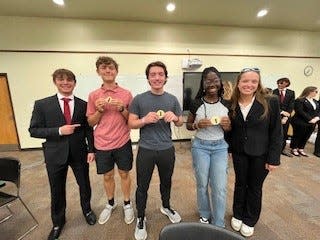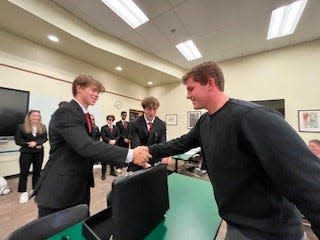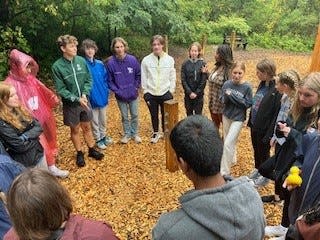Teens don't care about civics, right? These students are engaged, give me hope. | Opinion
On a recent glorious fall Sunday, I witnessed close to thirty high school students gather in the Wauwatosa West High School library. They were not there for a football game or dance, or any other similar teenage social gathering. Instead, they were there to be grilled on the workings of the American political system. And, to a student, they were thrilled to be going through such an arduous process.
These young people were high school juniors in Chad Mateske’s “American Public Policy Special Emphasis” course. Mateske, who has been a social studies teacher at Wauwatosa West for close to twenty years, uses the “We the People: The Citizen and the Constitution” program to prepare his students for life as citizens of the United States.
A program created by the Center for Civic Education, “We the People” casts students as teams of experts called to testify before Congress. The students offer an opening statement on a question related to American government; a group of adult judges then offer a series of follow-up questions. On this Sunday afternoon, the students were participating in what Mateske called a “dry run” performance, one that was meant to prepare the teams for a series of competitions that could lead them to the national “We the People” competition, to be held in April 2024 in the metropolitan Washington, DC area.

High school students answered tough questions thoughtfully
While I watched the teams of Wauwatosa West students both offer their opening statements and field a host of tough questions from the judges – for the trial run three this role was played by lawyers who also serve as program mentors – I was struck by the thoughtfulness and complexity of the ideas offered by the young people. Responding to a question based upon the relationship between students like themselves and the Bill Rights, I listened intently as team members unpacked concepts like “in loco parentis” and parsed out the details of Supreme Court cases like New Jersey v. T.L.O. (1985), a case that established the standard by which a public-school official can search a student in a school environment. Other teams connected the 1965 Voting Rights Act to contemporary struggles over gerrymandering and voting rights for ex-felons.
The students begin preparing for the class and competition in the summer before their junior year. Such an early start allows them, in Mateske’s words, “to learn a ton about how things work, and the history and philosophy behind that.” Such knowledge will make the students academically ready “for competition purposes,” but the class is ultimately about more than that. “We have this conversation,” Mateske continues, “on ‘What are our rights?’ I think what is missing from that is what are our obligations? This is contract between the people and the government, and that’s what my kids get to learn about, through social contract theory and things like that.”

Students say class opened their eyes about being involved
Student Keira Fax echoes such sentiments. Participating in Mateske’s class “definitely opened my eyes to how much I didn’t know if I hadn’t taken this class.” Yet there is a more specific outcome to the class for Fax.
“I get a better understanding of my rights and my role as a citizen," she said. Fax is now considering law school in the future.
Wisconsin deer hunting is dying: That should worry you even if you don't hunt.
Class teaching assistant and current Wauwatosa West senior Claire Davis reached a similar conclusion, noting that the course “shows you the importance of being [politically] involved.
"It shows you why you need to care. It shows you the people whose rights are in jeopardy if you don’t care," Davis said. She initially thought she wanted to pursue a career in the STEM (science, technology, and math) fields. She now wants to work in a US embassy after college.
I was put in touch with Mateske through the Wisconsin Civic Learning Coalition, an organization committed to bringing together stakeholders from across Wisconsin to improve nonpartisan civics and government education in schools. There is a need for such civics education programs, as Wisconsin is one of a small number of states that do not require a high school civics class for graduation, and more than a quarter of students never take a dedicated civics or government class.
Things across the country are not much better. Only 22% of eighth grade students scored “proficient” in civics on the most recent National Assessment of Educational Progress. Classes like Mateske’s are exactly the type of program that the Wisconsin coalition wants to publicize and encourage other educators to take as a model for civics education.

Many leave high school lacking knowledge of political system
As a college history professor, I am aware that young people often finish high school lacking an understanding of the United States' political system. Most inspiring about Mateske’s approach to civics education is the fact that he stresses the participatory potential in democracy to not only counter such ignorance, but to encourage involvement in American political life. Through the process of crafting and defending an argument – and then having to reckon with other perspectives – students are empowered to see a place for themselves in the landscape of American politics.
Letters to the editor: We must protect Wisconsin Supreme Court justice from intimidation and threats
Such a development has real-world repercussions. Diana Owen, the Director of the Civic Education Research Lab at Georgetown University, has found that students that participate in the “We the People” program are more inclined to vote in local elections, pursue a career in government service, and even run for political office. Who told me about Owen’s work? Wauwatosa West student Claire Davis.
We are now less than one year away from the important 2024 election cycle. I am heartened that high-school courses like Mateske’s exist, and that organizations like the Wisconsin Civic Learning Coalition are working to promote such experiences. In fact, the coalition has pledged to ramp up their efforts throughout the upcoming year. For the sake of democracy in Wisconsin and beyond, I wish them luck.
Michael H. Carriere is director of the Milwaukee School of Engineering University Scholars Honors Program and an associate professor in the department of Humanities, Social Science, and Communication.
This article originally appeared on Milwaukee Journal Sentinel: Teens defy Gen Z stereotype about political apathy thanks to civics
